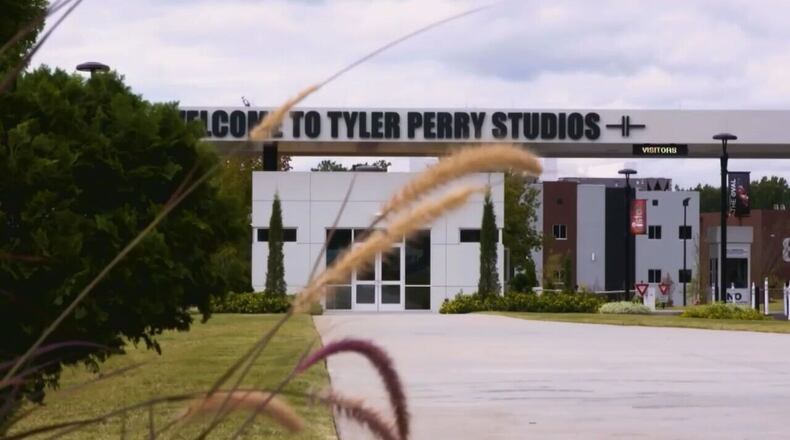The state legislature is currently debating whether to make changes to the TV and film tax credit and a bill that passed the Senate Finance Committee Wednesday night could help specific, mostly large studios in town but not necessarily media mogul Tyler Perry.
Tax credits mostly go to big media giants like Netflix, Apple, Amazon and Paramount, not the owners of the various soundstages in town. But Perry is not just the largest Georgia-based TV and film content producer, he also happens to own a large studio and rents out excess space to other companies.
If the 2008 tax credit system went away, soundstages would likely empty, according to industry officials, save for Perry’s studio. The Douglasville resident and Forbes-anointed billionaire has committed himself to the state and creates TV shows and films on his own property.
Credit: TNS
Credit: TNS
Currently what makes Georgia’s tax credit system so attractive to outside companies like Lionsgate and NBCUniversal is the fact it is uncapped, meaning there is no limit to how much they can spend to receive the credit, which is up to 30% of qualified expenditures. If a company spends $100 million on a film, they could receive up to $30 million back in tax credits.
States like New York, Louisiana and New Mexico limit how many tax credits they hand out each year.
The lack of a cap in Georgia is a boon for the likes of Sony and Warner Bros. Discovery, but causes uncertainty in the state’s finances given how big the film and TV tax credit system has become. Some legislators worry that if there is a flood of tax credits during a year the state budget is tight, it could cause problems.
The solution they are offering in the Senate limits the amount of tax credits transferred in any given year to 2.3% of the state budget starting in 2026. Under the current proposed budget for fiscal year 2024 of $36 billion, that would total about $830 million. For the past three fiscal years, more than $1 billion of tax credits has been certified each year, although the amount actually transferred each year has only surpassed $830 million once.
If there is enough business any fiscal year, this would act as a cap. And if those unqualified tax credits get rolled into the following fiscal year, it could cause a problematic logjam.
Almost all tax credits are transferred because most of those who receive them like Disney, Netflix and NBCUniversal have little if any state tax exposure. To gain the benefit of the credit, they have to sell the credits at a discount to a company or individual that needs the credit, like Coca-Cola or Home Depot that are located in the state, often at around 90 cents on the dollar.
But there is a curious new carve out in the Senate version of the legislation that didn’t exist in the original House bill, which had the tax credit transfer cap at a slightly higher 2.5% of the state budget.
The Senate version says a Netflix or Disney would be exempt from the tax credit transfer cap if they use studios that fit a particular criteria. Two criteria are if a studio spends at least $100 million between January 1, 2023 and June 30, 2027 to build new soundstages or have 1.5 million in total studio square footage. Currently, no studio is even close to qualifying for the second part.
Credit: RODNEY HO/rho@
Credit: RODNEY HO/rho@
Assembly Studios, which just opened last year and has spent more than $400 million to build out 22 soundstages in Doraville, would qualify under this criteria. Fayetteville’s Trilith Studios, which has been spending hundreds of millions of dollars expanding its soundstage space in the past couple of years and has been home to many high-budget Marvel movies, would likely qualify. Atlanta’s Shadowbox Studios, if it follows through on planned expansion in the coming years, could qualify as well.
Assembly, Trilith and Shadowbox represent 23% of all soundstage space in Georgia. If those three studios are fully utilized and are exempt from the tax credit transfer cap - if the Senate version passes as is - the cap may not ever be reached.
There is another way for a production company to avoid the transfer cap under the proposed Senate measure: if a film spends at least 50% of its production days in a county deemed “underutilized” by the Department of Economic Development as of Jan. 1, 2026, it could also be exempt from the cap and tax credits could be transferred without any restrictions.
Credit: RODNEY HO/rho@ajc.com
Credit: RODNEY HO/rho@ajc.com
Athens’ Athena Studios in Clarke County, which opened last year, will likely qualify, said Joel Harber, who runs that studio.
If Tyler Perry had gone through with plans to spend $800 million to add 12 more soundstages at Tyler Perry Studios, his studio would qualify for the tax credit transfer exemption as well. But he recently put a hold on his expansion because of worries regarding artificial intelligence reducing the need for traditional filmmaking.
So if he doesn’t spend at least $100 million to add more soundstages by mid-2027, his studio wouldn’t be exempt from the tax credit transfer cap.
Perry, through his spokesman, declined to comment.
The bill has a few hurdles before it reaches Gov. Brian Kemp’s desk. It now has to pass the Senate Rules Committee on Tuesday. If it makes it past there, it may hit the Senate floor for a vote by Thursday. Then the House and Senate would have to try to reconcile differences in the bill, which are not the same.
About the Author
Keep Reading
The Latest
Featured






